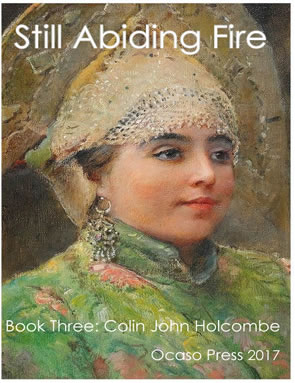This third and final book of 'That Still Abiding Fire' is again modelled on Dante's Divine Comedy, and again uses the terza rima form, but now showcases those who give themselves to art and aid of fellow human beings. Here the climb is from the misery and depravity of Book Two to the only heaven that human beings can know on this earth: those of altruistic love and artistic expression.

The first to appear is Alexander von Humboldt, the famous explorer and naturalist, who uses his practised sense of honesty and close observation to appreciate the wonders of the world around. Robert Herrick follows, whose eventual acceptance of a country living reconciles him to the dreams and ambitions of youth.
Then comes
Stendhal, with his keen appreciation of the feminine, which he would
make into a theory of love, of a loved one who is both true and
illusory. With Alexander Scriabin and Sergei Rachmaninoff we come to
the most abstract of the arts, which is nonetheless continually
fighting against the void. Musical composition is the rarest of gifts,
and its practitioners often live of the edge of madness. William Orpen
was a painter, a dazzlingly successful Edwardian society painter, but
he was also Irish and possessed of a troubling social conscience,
through which he felt a kinship with the millions sacrificed in the
First World War.
Tamara Platonovna Karsavina, a noted Russian
ballet dancer,joined the Ballets Russe when revolution swept over her
country and destroyed much of what she held dear. Ivan Bunin was also a
refugee from Russia, and wrote the most nostalgic depictions we have of
old Russia. He became displaced once again when Germany invaded France,
his new country of adoption, but never ceased writing.
Dr.
Rosemary Walker is the one fictitious character here, but exemplifies
the selflessness of foreign aid workers. Marcel Proust's search for
time past and recovered comes next, and then Giacomo Leopardi, for whom
the present was only pain and boredom. Sri Aurobindo solution was to
turn away from the world of the senses, as Indian mystics commonly do,
and discipline himself to feel some further deity of all-encompassing
love. Rainer Maria Rilke, that most lonely of men, who made poetry out
of that loneliness, rounds off the artists depicted.
The book starts with an Introduction and ends with an Envoie, both
placing the figures in their larger setting and summarising the themes
of the earlier books.
A free ebook in pdf format.
Time takes and moves us dreaming pieces on
as though its measures were that smiling face
that we remember when all else is gone.
Why ask of purpose in this hurtful place
that tells of other ways than what we are
when first of inwardness and childhood grace?
And yet there stays for us perhaps some star
whose homewarding will shed its upright light
and guide belatedly, if from afar.
Some house or hill or tree, some common sight
we saw unchanging on our evening strolls
that yet will reverence its keepsake rite.
Not part of us, it's true, but which consoles
us when we see some tended wayside shrine
that speaks of comradeship in passing souls.
The rest we do not know. The swelling line
of those who've gone before is endless night,
and hopes still-born in us make bitter wine.
Yet lives are various: each morning's bright
with dowered majesty that's plain enough,
if all the rest evade our mundane sight.
But these went questing on, a pathway rough
or smooth, ascending suddenly, or kept
to honest byways and parochial stuff.
They gave their lives to that, and overstepped
the settled limits of their scope and time,
to stare out earnestly while others slept.